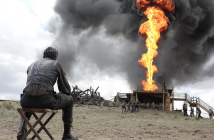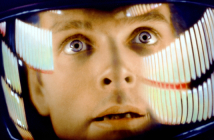
It’s been a while, kids. Nearly nine months, to be exact. When last we spoke, it was Oscar Day, after a season of unmitigated competitive churn wound up evenly divided between the two films that kicked off the season to begin with. Gravity took home the most Oscars by far, but 12 Years a Slave claimed Best Picture, a split that seems quite fitting in hindsight, for the two films essentially owned the Oscar season from the moment they flickered onto the screen at Venice and Toronto, going back and forth all season and even resulting in the first-ever tie in the history of the Producer’s Guild of America Awards. It was a fun season in its unpredictability – even if it was easily predictable that Gravity and 12 Years would be the last two films standing, it was anyone’s guess as to which film would win Best Picture.
Since I’ve been in hibernation since Oscar night, I must now own up to my first ever incorrect Best Picture prediction in the three-year history of Projection: Oscar. I was in good company, since the pundit landscape was pretty evenly divided in the Best Picture race, and if anyone claimed to have an inside track, they were lying. It was that kind of year…and that’s what makes this so wonderful. That, and the films themselves.

As we enter Year Four of Projection: Oscar a little later than usual, I must own up to another embarrassing fact: I was already wrong about super-early Best Picture prediction. There is no documentable proof, so I could keep this under my hat, but I owe you all complete transparency. In the months leading up to the release of Chris Nolan’s Interstellar, I felt pretty sure the film would be The One. Nolan has been flirting with Oscar for years now; most credit the extension of the Best Picture category to the exclusion of The Dark Knight in 2008, and two years later Inception was smothered by the one-two punch of The Social Network and The King’s Speech. As one who likes to read trends and trace history, I focused my mind on two crucial pieces of information. First, Nolan’s consistent status as an Oscar bridesmaid, so to speak. And second, the failure of the space-based Gravity to take home Best Picture last year. We all know Oscar likes to hand out “sorry about last year” awards from time to time, and this scenario seemed too tempting to ignore. It felt to me like Nolan’s time, as he emerged from the Dark Knight trilogy with a much more personal epic, not to mention one that falls vaguely into the same genre as the film that fell just short of Best Picture last year. Those factors – combined with a series of jaw-dropping, soul-stirring trailers – led me to believe it was Interstellar’s season before the season even formally began.
I was way wrong.
Not to completely dismiss the film’s hopes. Interstellar may yet be a minor Oscar player…in fact, the film’s epic scope, respected filmmakers, and small group of fervent loyalists may even result in a Best Picture nomination in an expanded field. But it will not win. Not even close. It’s not widely accepted in the critical sphere (73% on Rotten Tomatoes as of today, solid but not overwhelming), which surely does influence the aura that surrounds the film throughout the season. Even if Nolan’s ambitious saga was a love-it-or-hate-it enterprise, it might stand a chance, since the weighted balloting means passion is crucial to a Best Picture win. But reaction is really more even-keeled – more respectful than resounding. As a result, the film immediately becomes a Best Picture afterthought.
Another confession: Interstellar left me, to turn a professional phrase, a little butthurt. It just plays and plays and plays, going deeper and deeper until it can’t escape it’s own labyrinthine black hole. Some sequences are dazzling, and other extended sections continue pondering and plodding despite hitting a narrative and emotional dead end several minutes earlier. Matthew McConaughey is positively astounding, continuing a streak of brilliance that goes all the way back to the summer of 2012. The other actors, however, frequently fall flat, and it’s not their fault; the screenplay leaves them stranded to spout wooden filler and cross-eyed exposition. It’s quite disheartening since Nolan’s effort is so sincere and so broadly ambitious. And to be fair, not everyone shares my decidedly negative opinion…but the fact that opinions like mine exist mean this movie cannot attain the type of consensus that is required to make a serious Best Picture play.
So…why spend so much time on this year’s first Projection: Oscar column pondering a movie that isn’t going to contend for Best Picture? Well, it’s to illustrate the fact that this year will not be so top heavy as last. The two films to shoot to the heavens in the early fall festivals were Birdman and Foxcatcher, both of which are much smaller and quirkier than last year’s breakout duo. Hard to imagine those films carrying the season for months, even though both will certainly be in the mix in multiple categories. Damien Chazelle’s Whiplash is a stunning masterwork, but is it too harsh and uncompromising for the Oscar crowd? The Theory of Everything and The Imitation Game are standouts for Eddie Redmayne’s and Benedict Cumberbatch’s performances, respectively, but will that love extend to the films themselves? Ava DuVernay’s Selma is suddenly a high-profile player, but is still a small film that needs to build and sustain its following. How about J.C. Chandor’s A Most Violent Year? Will it only be an acting showcase or will it make a play for Best Picture? Richard Linklater’s Boyhood has been around for what seems like forever…can it hang around long enough to be a major player in multiple categories?
There are several possibilities in what appears to be a wide-open race, but what do all these films have in common? They are all small, relatively low-budget films. No one film is bigger than the other, for the most part. Generally speaking, the smaller films will cave under the weight of a larger release, with more firepower and more inclusive thematic storytelling. But is there such a film? Maybe Angelina Jolie’s Unbroken, long considered a frontrunner for months now. It’s the biggest and most universal of all contending films at the moment. Is the Best Picture race really going to boil down to something that simple?
Time will tell, as it always does. For now, though, it’s time to sit back and let the movies speak for themselves.




